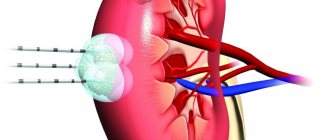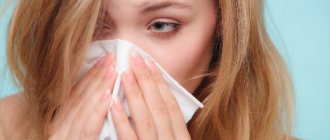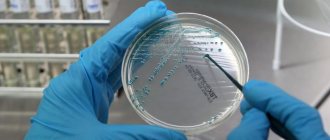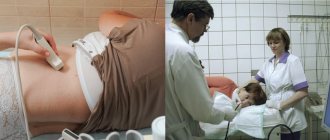During pregnancy, a complete restructuring of the body occurs, the adaptation of all organs and systems to bearing a child. Due to hormonal changes, mood swings and emotional disturbances are observed.
Immune defense weakens, hidden diseases make themselves felt. Urticaria is a common occurrence during pregnancy. Urticaria in pregnant women is a skin disease that is predominantly allergic in nature and manifests itself in the form of a widespread itchy rash on the body.
Symptoms of urticaria in pregnant women
The main symptom of the disease is flat or raised blisters, reminiscent of a nettle sting or mosquito bite. The blisters have an irregular round shape, surrounded along the entire perimeter by a bright pink or red edging.
The number of formations is constantly growing, they increase in size and merge.
Rashes appear, as a rule, spontaneously, on any one part of the body and gradually spread everywhere.
Images of the various manifestations of urticaria in pregnant women, shown in the photo, will allow you to quickly compare symptoms and begin treatment.
A big problem for the expectant mother is the constant companion of nettle rashes - itching. Problem areas itch unbearably, day and night. A woman cannot rest, get a full night's sleep, and becomes irritable.
With the protracted nature of the disease, a general deterioration of the condition may occur:
- temperature rises;
- nausea and vomiting are observed;
- headaches and dizziness occur;
- blood pressure drops.
In general, the prognosis for the outcome of the disease is favorable; over time, the symptoms will disappear without a trace. However, this may not happen soon. The acute phase usually lasts about 1 month, and the chronic phase up to a year.
Important
The most dangerous consequence of urticaria is anaphylactic shock and Quincke's edema. It is necessary to urgently call an ambulance if signs of swelling on the face, barking cough, hoarseness, or drop in blood pressure appear. Any delay can lead to death.
Find out more
Symptoms and signs
The clinical picture of the disease is typical for allergic urticaria and manifests itself as:
- skin redness and itching;
- rash and blisters, pruritic urticarial papules appear;
- Swelling of the face and limbs may occur.
Especially for pregnant women , the disease is accompanied by a general state of nervousness and irritability. Sleep disturbances are common.
External manifestations are localized on the abdomen, then spread to the thighs and buttocks, sometimes to the chest.
In the early stages, the disease rarely manifests itself, but can be caused by the fact that when a sperm penetrates the egg, the woman’s body perceives it as “foreign”.
Photos of symptoms
What does urticaria look like during pregnancy, look at the photo below:
Causes of urticaria in pregnant women
The causes of urticaria in pregnant women can be divided into the following groups:
- allergic;
- autoimmune;
- urticaria as a symptom of a concomitant internal disease.
Allergic reactions
Symptoms of urticaria occur under the influence of histamine, an activator of inflammatory processes. Histamine is found in special white blood cells (mast cells). By combining with the ingested allergen, histamine is released from mast cells and causes inflammation and rash on the skin.
This type of reaction is called immediate because the first symptoms can be noticed 30 minutes after contact with the allergen.
Types of urticaria that occur as an allergy:
Food. Allergens are food products. From insect bites. Substances provocateurs are poisons. Contact. The allergenic substance penetrates the skin. For example, urticaria on the hands occurs upon contact with household chemicals, on the face - with creams and cosmetics. Physical: photodermatosis (from the sun); aquagenic (from water contact with water); cold (from low temperatures); mechanical (from wearing tight clothing, friction, pressure).
Allergens do not enter the body directly. The process of histamine release is triggered by external factors.
Autoimmune reactions
In this case, urticaria occurs as a result of the circulation of antibodies that the immune system produces against its own cells. This is how serious diseases such as multiple sclerosis, type I diabetes mellitus, rheumatoid arthritis, and systemic lupus erythematosus begin.
Treatment of urticaria in pregnant women
Treatment of urticaria during pregnancy should be carried out under the supervision of a dermatologist or allergist. Only a doctor will be able to select therapy taking into account 2 most important principles: to alleviate the condition of the expectant mother and not to harm the developing fetus.
The treatment regimen for urticaria during pregnancy consists of solving several sequential tasks:
- determining the cause of the disease;
- exclusion of direct contact with disease provoking factors;
- symptomatic treatment;
- specific treatment of concomitant diseases and conditions.
Diagnosis of urticaria in pregnant women
Identifying the underlying cause of hives in pregnancy is critical to effective treatment. There are no specific methods for diagnosing urticaria. Clinical blood and urine tests will be uninformative.
They will show the presence of an allergic reaction in the body, but this is also visible visually. In order to distinguish one form of the disease from another, special diagnostic tests are sometimes used: allergy tests, provocation tests for the effects of cold, sun, and physical activity. But during pregnancy, all of them are prohibited.
Therefore, the diagnosis of skin rashes during pregnancy is made on the basis of a physical examination and medical history. The doctor evaluates the appearance and location of the rash, the severity of the condition, how long ago the symptoms began, and identifies possible influencing factors.
If the cause is determined correctly, treatment may not be needed at all. After eliminating contact with the allergen, the symptoms will disappear on their own and without a trace.
The main causes of the disease
If you experience an allergic reaction or any other disease during pregnancy, you must remember that internal organs are affected due to exposure to chemical elements. During this period, a woman’s body undergoes serious hormonal changes. As a result, urticaria develops, which can lead to psychological disorders. If the disease progresses and the blisters do not disappear within several days, then drug treatment is prescribed.
It should be noted that the immune system reacts quite clearly to each incoming antigen into the body, especially during pregnancy. The main causes of urticaria can be detergent chemicals, dyes, and poor diet. During the development of urticaria, you should avoid eating sweets, dairy products, citrus fruits, and strawberries.
Drug treatment of urticaria in pregnant women
It is unacceptable to independently select medications for urticaria during pregnancy; only the doctor can decide what to treat.
Among the pharmacological agents for the treatment of urticaria in pregnant women, the following are used:
Sorbents. These are solids or liquids that are not digested and are excreted naturally. Passing through the digestive tract, they capture harmful substances (toxins, microbes, allergens) and cleanse the body.
In general, drugs in this group are harmless. But during pregnancy they should be taken only for indications, and not for prevention. After all, along with allergens, sorbents also remove useful substances necessary for the development of the fetus (vitamins, minerals, liquid). Antihistamines. The principle of action of these drugs is to block the production of histamine.
As a result, there is a softening or disappearance of the symptoms of urticaria: itching stops, swelling and inflammation subsides, and the formation of blisters stops. The doctor selects the correct combination of drugs in this group. Some of them may be ineffective, and some may be dangerous during pregnancy, especially in the first trimester.
Ointments and creams for topical use. Used for local application to specific areas of the body to reduce itching, burning and pain.
Features of the course of the disease in different trimesters of pregnancy
Most often, acute urticaria occurs in the first weeks after conception. This is due to the fact that at this time the immune system is most weakened and tries to adapt to an organism that is still foreign to it - the fetus.
The course of allergies is aggravated by the fact that it is in the first trimester that women most often experience severe toxicosis. Treating urticaria early should be the safest.
The urticaria that develops in the first weeks goes away or decreases by the beginning of the second trimester. But there is a danger of its becoming chronic, the exacerbation of which occurs with the slightest influence of the irritant.
In the last weeks of pregnancy, urticaria can be combined with gestosis, so it also cannot be ignored and treated independently.
Traditional medicine
Traditional medicine recipes can be used in the treatment of urticaria in pregnant women only as an addition to traditional therapy.
To relieve itching and pain, decoctions of medicinal herbs are helpful: chamomile, calendula, string. Cotton pads soaked in the medicinal infusion are applied to the affected areas of the rash. If blisters are widespread, you can take baths with the addition of herbal decoctions.
To relieve swelling and inflammation, you can apply slices of cucumber, raw potatoes or cabbage leaves to the sore spot.
It is very important for the expectant mother to protect herself from worries and worries. Mint leaves are used as a sedative. They are added to tea or made into a tincture in boiling water.
Prevention of urticaria in pregnant women
During pregnancy, a woman is responsible not only for her own health, but also for the health of the unborn child. Taking medications and being in a stressful state will negatively affect the development of the fetus. The most basic precautions will protect you from such troubles as urticaria during pregnancy.
Preventive measures:
Watch your diet. Adhere to a special hypoallergenic diet. Give preference to home-cooked dishes and do not try unfamiliar products. Limit the use of cosmetics or buy them at the pharmacy.
Do not expose your skin to prolonged exposure to heat or cold. Do not sunbathe, do not swim in bodies of cold water, do not walk in frosty weather. For exposed areas of the body, use protective creams and ointments.
Wear loose clothing made from natural fabrics. Avoid physical activity, long walks, long trips. Visit your local doctor regularly. Get tested in a timely manner. Do not take medications without consulting your doctor.
The danger of urticaria for the body of a woman and the fetus
The allergic reaction itself has virtually no negative effect on the development of the fetus. The only thing that increases after birth in a child is the tendency to allergies.
But you need to know that certain medications, their incorrect choice, dosage and duration of treatment can disrupt the formation of organs of a child developing in the womb. Therefore, for the prescription of antiallergic and other groups of drugs for urticaria, you should contact an experienced allergist.
The negative effect of allergic reactions on the body of a pregnant woman is also explained by the fact that such diseases, due to body itching and other manifestations, cause severe nervousness and disrupt sleep. Constant irritability and lack of sleep lead to psycho-emotional discomfort, which is not very good for both the expectant mother and her baby.
Growing angioedema also poses a threat. The suffocation that occurs with this complication without the use of special drug therapy can cause death.
It must be remembered that in pregnant women all pathological processes develop very quickly, and if the allergy begins to increase, then you need to immediately call an ambulance.
Hypoallergenic diet
Poor nutrition during pregnancy is the main cause of hives. Following a special hypoallergenic diet will help avoid urticaria in both the expectant mother and the newborn during breastfeeding.
The main principle of such a diet is the exclusion from the diet of foods that increase the risk of allergies:
- eggs;
- poultry meat;
- Fish and seafood;
- citrus;
- nuts;
- red berries, fruits and vegetables;
- honey;
- chocolate;
- products containing histamine (sauerkraut, radish, radishes);
- sausages and sausage products;
- industrial sauces (mayonnaise, ketchup);
- products with dyes and food additives.











